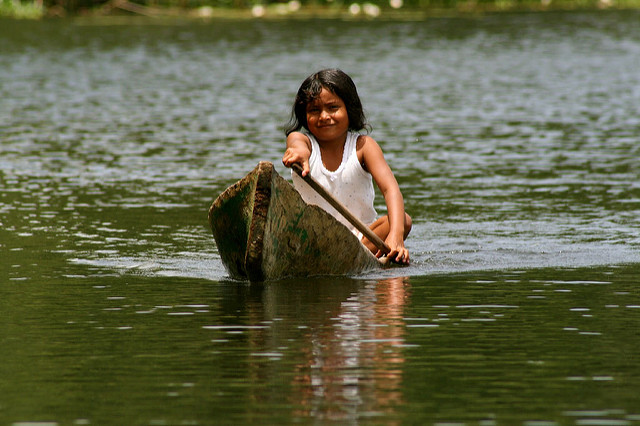Photo: Rio Dulce by Daniel John Buchanan
It has been three decades now since the Brundtland Report also known officially as World Commission on Environment and Development, entitled “Our Common Future” was launched in 1987. It is by no means just another report from an UN agency. It is a game-changer in that it called for a “new” of thinking that would ensure better quality of life in generational terms. The catch phrase that quickly becomes part of the global conversation is undisputedly “sustainable development.” Very soon it gets embedded into the education sector lead by UNESCO giving rise to a new framework called “Education for Sustainable Development” (ESD).
Indeed from 2005 to 2014, the UN declared a Decade on Education for Sustainable Development (DESD) where governments throughout the world collectively adopted it within the ESD framework. Believe it or not, it is the “education” component more than anything that actually drives the agenda forward throughout the DESD. However, make no mistake that the “E” in ESD is distinctively different from the regular education in terms of content, approach, structure as well as outcomes.
The ESD is transformational as understood from the very concept of Sustainable Development (SD), that is commonly understood as: to meet the needs of the present without compromising the needs of the future generations. In other words, it is at once collaborative- and community-oriented. For this to be possible a new governance design that came to be known as the Regional Centre of Expertise (RCE) on ESD was introduced as an innovative platform for implementation. Starting from seven pioneering centres in selected part of the world established in 2005, today there are more than150 RCEs have been acknowledged worldwide, and counting. The rapid growth of the RCEs is a testimony that the platform is a viable one for ESD to be realised globally. It turned out to be a vital vehicle to take SD to the next level by translating not just ideas and concepts but equally vital practices and worldviews. By 2014, when DESD draws to a close, SD has gained global acceptance with a number of higher education institutions playing key roles in rooting ESD into the curriculum or otherwise carrying out collaborative activities with the community in creating greater demand and awareness. Many of the RCEs are led by universities with support from other local organisations and civil societies facilitating the transformational shift into a network of networks promoting ESD collectively.
It was also in 2014, during my time as President of the International Association of Universities (IAU) that the Association decided to focus more attention on indigenous knowledge and the need to better understand the ancestral perspectives as the “forgotten” part of ESD. Following the IAU 2014 International Conference on Blending Higher Education and Traditional Knowledge for Sustainable Development which in Iquitos, Peru, March 2014, a normative instrument known as the IAU Iquitos statement on higher education for Sustainable Development was adopted. It was then presented at the International Conference on Higher Education for Sustainable Development: Higher Education Beyond 2014(link is external) on 9 November 2014, in Nagoya University, Japan.
Succinctly, it recognises that indigenous knowledge and wisdom that well preceded the Brundtland report have a significant role to play to contextualise ESD as the new platform influencing the purpose of education, and how education is being reoriented towards a more sustainable future. In a manner of speaking SD and ESD is nothing “new” if we trace it back to the many facets practised by our forefathers especially focused on values and ethics. It may be called by other names but the impact is unmistaken. Anthropocentrism was not an issue then as it being categorically singled out today. This is made very apparent over the period of DESD whereby indigenous knowledge and wisdom found their way to be firmly anchored in the ESD framework while further widening the relevance of ESD over and above the scope envisaged in 1987. It sets up new focus on ESD by broadening and enriching it as a living educational approach that engages and collaborates with real life communities; actualises sustainable livelihood as real life experiences beyond the limits of living labs; and it invites for an even greater involvement of the global community in promoting and preserving relevant indigenous norms, values and practices in all that we do. More importantly, it blends indigenous knowledge and wisdom with the existing “modern” knowledge in articulating “newer” ideas that have been cast aside by the excesses of colonisation.
In practical terms, it brought to live the practices of trusteeship, harmony and balance beyond that of ownership and growth in constructing a “better” ESD that is more naturally inclined without so much imposition from the outside.
Summarily, another wave of ESD is emerging requiring us that to be prepared to ride it by enabling ‘co-learning’ to ‘co-exist’ in a balanced way in order to navigate towards an even more sustainable future. The processes of decolonising SD becomes vital in this sense if ESD is to have greater meaning and impact by making the diverse cultural context more organically rooted and intact for generations to come. As it stands today, ESD implementation is somewhat artificially imposed by the limits of the Brundtland reports that does not give sufficient latitudes to indigenous knowledge and wisdom that harken back to several centuries. The time has come to mainstream them back as a living heritage before colonisation wasted them for many centuries now. Sustainability is indeed our collective heritage before it becomes fashionable within a very limited scope as it is currently.
—
*Democracy is a process and democracy in a university is a process that we have to work at everyday *- Nelson Mandela (1918-2013)

